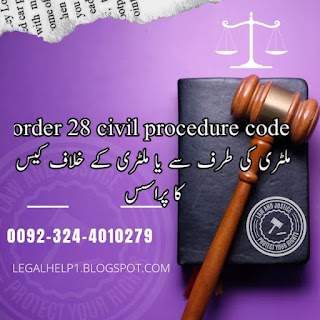Order 28 civil procedure code
 |
| Order 28 civil procedure code |
ORDER XXVIII
SUITS BY OR AGAINST MILITARY [OR NAVAL]MEN [OR AIRMEN]
1. - (1) Where any officer, [soldier, sailor or airman] actually [in the service of the State]
in [such] capacity is a party to a suit, and cannot obtain leave of absence for the purpose
of prosecuting or defending the suit in person, he may authorise any person to sue or
defend in his stead.
(2) The authority shall be in writing and shall be signed by the officer, [soldier, sailor or
airman] in the presence of (a) his commanding officer, or he next subordinate officer, if
the party is himself the commanding officer, or (b) where the officer, [soldier, sailor or
airman] is serving in military [naval] [or air force] staff employment, the head or other
superior officer of the office in which he is employed. Such commanding or other officer
shall counter sign the authority which shall be filed in Court.
(3) When so filed the countersignature shall be sufficient proof that he authority was duly
executed, and that the officer, [soldier, sailor or airman] by whom it was granted could
not obtain leave of absence for the purpose of prosecuting or defending the suit in person.
Explanation - In this Order the expression "commanding officer" means the officer in
actual command for the time being of any regiment, corps, [ship] detachment or depot to
which the officer, [soldier, sailor or airman] belongs.
2. Any person authorised by an officer, [soldier, sailor or airman] to prosecute or defend a
suit in his stead may prosecute or defend it in person in the same manner as the officer,
[soldier, sailor or airman] could do if present; or he may appoint a pleader to prosecute or
defend the suit on behalf of such officer, [soldier, sailor or airman].
3. Processes served upon any person authorised by an officer, [soldier, sailor or airman]
under rule 1 or upon any pleader appointed as aforesaid by such person shall be as
effectual as if they had been served on the party in person.
legal procedures may be applied in cases where the military is a party, based on the principles of law.
### **Suits by or Against the Military:**
### **Key Considerations:**
1. ** **Jurisdiction and Applicability:**
- Suits involving the military may fall under the jurisdiction of military or civilian courts, depending on the nature of the case. Military courts often handle matters related to military discipline, while civilian courts may adjudicate civil or criminal cases involving military personnel.
2. ** **Special Rules and Protections:**
- Military personnel may be subject to specific rules and protections that differ from those applicable to civilians. These rules could relate to issues such as jurisdiction, discipline, and the handling of classified information.
3. ** **Representation:**
- In cases involving the military, legal representation may be provided by military advocates or legal officers. The manner in which the military is represented in court may depend on the legal framework of the jurisdiction.
4. ** **National Security Considerations:**
- Cases involving the military may involve sensitive information related to national security. Courts may implement procedures to safeguard such information while ensuring a fair trial.
### **Procedure for Suits Involving the Military:**
1. ** **Filing the Suit:**
- Suits involving the military are initiated through the filing of a complaint or petition. The nature of the case and the relief sought will determine the appropriate court and legal procedures.
2. ** **Legal Representation:**
- Military personnel may be represented by legal officers or advocates designated by the military authorities. The representation may vary based on the specific legal system and regulations in place.
3. ** **Compliance with Military Law:**
- Courts handling cases involving the military may need to consider and apply relevant military laws and regulations. This may include adherence to military codes of conduct and disciplinary procedures.
### **Conclusion:**
While Order 28 of the Civil Procedure Code focuses on the general procedures for the examination of witnesses through commissions, suits involving the military may necessitate additional considerations. The legal framework governing such cases often extends beyond the Civil Procedure Code to encompass military laws and regulations. Legal practitioners handling suits involving the military should be well-versed in both civil and military legal frameworks to ensure a fair and just resolution of the matter. It is advisable to consult the latest legal provisions and seek guidance from our legal experts familiar with the jurisdiction's military law.



Comments
Post a Comment